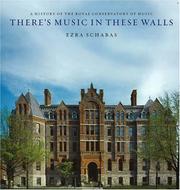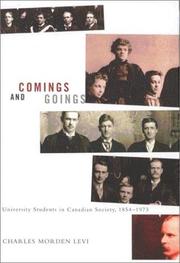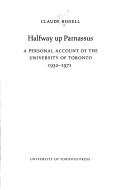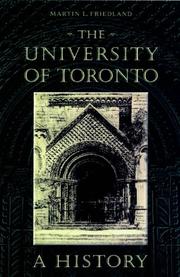
ISBN: 1554883636 1281970212 9786611970215 9781554883639 9781459712508 1459712501 1550025406 9781550025408 9781281970213 6611970215 Year: 2005 Publisher: Toronto, Ontario : The Dundurn Group,
Abstract | Keywords | Export | Availability | Bookmark
 Loading...
Loading...Choose an application
- Reference Manager
- EndNote
- RefWorks (Direct export to RefWorks)
Book
ISBN: 0665456107 9780665456107 Year: 1873 Publisher: [S.l. : publisher not identified,
Abstract | Keywords | Export | Availability | Bookmark
 Loading...
Loading...Choose an application
- Reference Manager
- EndNote
- RefWorks (Direct export to RefWorks)
Natural history --- Philosophy --- Philosophie --- Sciences naturelles --- Examinations. --- Examens. --- University of Toronto

ISBN: 128286078X 9786612860782 0773570632 9780773570634 9781282860780 0773524428 0773524436 9780773524422 9780773524439 Year: 2003 Publisher: Montreal ; Ithaca : McGill-Queen's University Press,
Abstract | Keywords | Export | Availability | Bookmark
 Loading...
Loading...Choose an application
- Reference Manager
- EndNote
- RefWorks (Direct export to RefWorks)
Looking at almost 120 years of Canadian history, Charles Levi examines the origins, activities, and careers of 1,876 members of the executive of the University College Literary and Athletic Society of the University of Toronto from the inception of the College until 1973. Using an intricate quantitative analysis of data from student records and genealogical sources, Levi charts the history of student activities at University College, filling a gap in the historiography of higher education in Canada. In an era when all forms of education are being scrutinized to determine if they are fulfilling their functions, Comings and Goings shows that the Canadian university has continually adapted to the needs of society as a whole and that Canadian university students have used their educational experiences in innovative ways.
University College (Toronto, Ont.) --- University of Toronto --- University of Toronto. --- Toronto (Ont.). --- Students --- Societies, etc. --- History. --- 378.4 <71> --- 378.4 <71> Universiteiten--Canada --- Universiteiten--Canada --- Étudiants --- Associations --- Histoire. --- EDUCATION / History. --- Etudiants
Periodical
ISSN: 22937684
Abstract | Keywords | Export | Availability | Bookmark
 Loading...
Loading...Choose an application
- Reference Manager
- EndNote
- RefWorks (Direct export to RefWorks)
Business --- Management --- Affaires --- Gestion --- Business. --- Management. --- Industrial relations --- Organization --- Trade --- Economics --- Commerce --- Industrial management --- Joseph L. Rotman School of Management --- Rotman School of Management --- Joseph L. Rotman School of Management. --- University of Toronto --- University of Toronto.

ISBN: 9781442632059 1442632054 9781442633735 1442633735 0802021727 9780802021724 1442651970 Year: 1974 Publisher: Toronto ; Buffalo : University of Toronto Press,
Abstract | Keywords | Export | Availability | Bookmark
 Loading...
Loading...Choose an application
- Reference Manager
- EndNote
- RefWorks (Direct export to RefWorks)
Halfway up Parnassus is a personal account of the University of Toronto with particular emphasis on the period when Dr. Bissell was its president, from 1958 to 1971. The first half of that period was the flowering of the old, self-confident university, with its established patterns of government, and its untroubled constituents. The second half saw the slow, powerful emergence of a new university, uncertain of itself and its role, seeking to find a form for democratic aspirations-not, however, without some dramatic confrontations with left-wing students. Nowhere in Canada was the process more sharply defined than at the University of Toronto. This book records that process from the point of view of a major participant. It is also intended as a series of portraits of major academic figures and as an intimate recollection of a society that is passing away. It is not a philosophical book about education, but a human document-an attempt to render the tone of academic society, and in this account Dr. Bissell has combined, to great effect, autobiography, descriptive narration, and historical analysis. The book will be of interest to Canadians concerned about our intellectual and cultural life, and to academic societies everywhere.
EDUCATION / History. --- Bissell, Claude Thomas, --- Bissell, Claude, --- University of Toronto --- U of T --- Université de Toronto --- Universitet Toronto --- UToronto --- University of King's College (Toronto, Ont.) --- University of Toronto. --- History.
Book
ISBN: 0268158371 0268077851 9780268077853 9780268158378 9780268026202 0268026203 Year: 2015 Publisher: Notre Dame, Indiana : University of Notre Dame Press,
Abstract | Keywords | Export | Availability | Bookmark
 Loading...
Loading...Choose an application
- Reference Manager
- EndNote
- RefWorks (Direct export to RefWorks)
"'Like the Polish flag, composed of two contrasting colors, red and white, my memoirs are cast in red and white. 'Red' treats largely my wartime life in Europe, life full of blood and death. My success in that part of my life was survival. 'White' represents my successful migration and peaceful life in America'--from the Preface; Born after World War I into an educated and progressive Polish family, Peter F. Dembowski was a teenager during the joint occupation of Poland by Nazi Germany and the Soviet Union. His account of life as a young Polish soldier, as an immigrant to Canada, and finally as an American professor is a gripping narrative of life before, during, and after the horrors of World War II. Skillfully weaving a tapestry of emotion and history, Dembowski recounts the effects of loss: at age twelve, his father's death; and later, the arrest of his mother and sister by the Gestapo and their execution in 1942 in the women's concentration camp of Ravensbruck. Balancing those tragedies, Dembowski recalls the loving care given him by Janina Dembowska, the wife of his paternal uncle, as well as the inspiring strength of character he witnessed in his teachers and extended family. Still a very young-looking teenager, Dembowski became involved with the Polish Underground in 1942. Suspected as a konspirator, he was incarcerated in Pawiak Prison and later, after a rare release, fought in the Warsaw Uprising of 1944. His on-the-ground account describes the deprivations Polish soldiers faced as well as the fierce patriotism they shared. With the defeat of the Uprising, he was deported to Sandbostel; once liberated, he joined the Polish Army in Italy, serving there for two years. In 1947, Dembowski made the momentous decision not to return to Poland but rather to emigrate to Canada. We learn of his stint as a farmhand and, later, of his studies at the University of British Columbia in Vancouver. He continued his education in France, receiving a Doctorat from l'Universite de Paris in Russian philology and, in 1960, a PhD from the University of California at Berkeley in medieval French. In tandem with his successful academic career teaching at the University of Toronto and at the University of Chicago, Dembowski describes his happy marriage and the joy of family life; 'Peter F. Dembowski's Memoirs Red and White : Poland, the War, and After is the moving testimony of an individual who has had firsthand knowledge of the most dramatic moments in the history of the twentierth century. His story is one of heroic courage, honesty, and optimism'--Thomas Pavel, Gordon J. Laing Distinguished Service Professor in Romance Languages and Literature, University of Chicago"--
World War, 1939-1945 --- Soldiers --- Polish people --- Immigrants --- Underground movements --- Dembowski, Peter F. --- Family. --- University of Toronto --- University of Chicago --- Faculty --- Poland --- History

ISBN: 1282037005 9786612037009 1442682507 9781442682504 9781442667594 1442667591 9781282037007 0802044298 9780802044297 6612037008 1442659297 9781442648007 1442669152 0802088104 1442615362 1442648007 Year: 2013 Publisher: Toronto, [Ontario] ; Buffalo, [New York] ; London, [England] : University of Toronto Press,
Abstract | Keywords | Export | Availability | Bookmark
 Loading...
Loading...Choose an application
- Reference Manager
- EndNote
- RefWorks (Direct export to RefWorks)
"The University of Toronto is Canada's leading university and one of Canada's most important cultural and scientific institutions. In this history of the University from its origin as King's College in 1827 to the present, Martin Friedland brings personalities, events, and changing visions and ideas into a remarkable synthesis. His scholarly yet highly readable account presents colourful presidents, professors, and students, notable intellectual figures from Daniel Wilson to Northrop Frye and Marshall McLuhan, and dramatic turning points such as the admission of women in the 1880s, the University College fire of 1890, the discovery of insulin, involvement in the two world wars, the student protests of the 1960s, and the successful renewal of the 1980s and 1990s. Friedland draws on archival records, private diaries, oral interviews, and a vast body of secondary literature. He draws also on his own experience of the University as a student in the 1950s and, later, as a faculty member and dean of law who played a part in some of the critical developments he unfolds. The history of the University of Toronto as recounted by Friedland is intimately connected with events outside the University. The transition in Canadian society, for example, from early dependence on Great Britain and fear of the United States to the present dominance of American culture and ideas is mirrored in the University. There too can be seen the effects of the two world wars, the cold war, and the Vietnam war. As Canadian society and culture have developed and changed, so too has the University. The history of the University in a sense is the history of Canada."
DISCOUNT-C. --- HISTORY / Canada / General. --- University of Toronto --- U of T --- Université de Toronto --- Universitet Toronto --- UToronto --- University of King's College (Toronto, Ont.) --- University of Toronto. --- History. --- #BIBC:CANADIANA 2002 --- 378.4 <71 TORONTO> --- 378.4 <71 TORONTO> Universiteiten--Canada--TORONTO --- Universiteiten--Canada--TORONTO --- HISTORY --- EDUCATION --- Post-Confederation (1867- ) --- Higher.
Book
ISBN: 9786611969806 128196980X 1554883199 1282809121 9786612809125 1770700897 9781554883196 1550023209 9781550023206 9781281969804 9781282809123 9781770700895 Year: 1999 Publisher: Toronto, Ontario ; Oxford, England : Dundurn Press,
Abstract | Keywords | Export | Availability | Bookmark
 Loading...
Loading...Choose an application
- Reference Manager
- EndNote
- RefWorks (Direct export to RefWorks)
How has the Ontario Agricultural College contributed to Canadian education? What role has the college played in the development of agriculture since it was founded in 1874? This history of Canada's oldest agricultural college revolves around these two questions. It shows that the college's mandate has changed in its attempt to serve both education and agriculture. The Ontario Agricultural College was established to enshrine science in farming, but it also became the testing and extension arm of the provincial ministry of agriculture. Direct government control for ninety years pr
Agriculture --- Farming --- Husbandry --- Industrial arts --- Life sciences --- Food supply --- Land use, Rural --- Study and teaching (Higher) --- History. --- Ontario Agricultural College --- Ontario. --- University of Guelph --- University of Toronto --- Guelph (Ont.). --- O.A.C. --- OAC --- Ontario Agricultural College and Experimental Farm --- Ontario School of Agriculture --- Toronto (Ont.). --- University of Guelph. --- University of Toronto.
Book
ISBN: 1487583354 9781487583354 9781487582067 1487582064 Year: 2019 Publisher: Toronto : University of Toronto Press,
Abstract | Keywords | Export | Availability | Bookmark
 Loading...
Loading...Choose an application
- Reference Manager
- EndNote
- RefWorks (Direct export to RefWorks)
Ernest Sirluck's life has been full of passion and, not infrequently conflict. His childhood and youth as a Jew in a predominantly Mennonite Prairie village, his service as a divisional intelligence officer in Europe during the Second World War, and his experience as a professor and university administrator during a period of dramatic changes produced a man of firm convictions and the ability to fight for them. His story charts his many battles: against antisemitism and Nazism, mediocrity and academic complacency, ideological zealotry, and government and union encroachment on university autonomy. But he is, first and foremost, an educator, and his autobiography provides an intimate intellectual history of mid-century universities, spiced with anecdotes about the many prominent educators he worked with, among them E.K. Brown, A.S.P. Woodhouse, Northrop Frye, and Marshall McLuhan. Born to Russian Jewish parents in Winkler, Manitoba, Sirluck, grew amidst the antisemitism of the 1930s. This was a particularly strong influence in his life -- the swastika-flaunting Canadian Nationalist Party, exploiting the misery of the Great Depression, had found a receptive audience for their Nazi-influenced propaganda in the German-speaking Mennonite community. During the Second World War, Sirluck interrupted his university education to serve in the field with the Canadian army in Europe. After the war he pursued his doctorate while teaching English literature at the University of Toronto, then was appointed to the University of Chicago, where he taught for fifteen years. When he eventually returned to the University of Toronto to become graduate dean and vice-president, he seized the opportunity to initiate an inter-university rationalization of graduate studies and library services throughout Ontario. Subsequently he was appointed president of the University of Manitoba, where a reduced level of public funding and the influence of a union-oriented government led to the university's general unionization and its first strikes. The special value of this work lies in the unique perspective that Sirluck brings to familiar and unfamiliar event and issues. His deeply held beliefs, persuasive analytical powers, and richly detailed memories combine to make this a fascinating autobiography.
College teachers --- Sirluck, Ernest, --- University of Toronto. --- University of Manitoba. --- University of Chicago. --- University of Manitoba --- University of Toronto --- University of Chicago --- Chicago. --- Chicago Üniversitesi --- University of Chicago (1857-1886) --- U of T --- Université de Toronto --- Universitet Toronto --- UToronto --- University of King's College (Toronto, Ont.) --- Manitoba. --- Manitobsʹkyĭ universytet --- Université du Manitoba --- U of M --- UM
Book
ISBN: 0772767041 Year: 2000 Publisher: Toronto : Faculty of Applied Science and Engineering, University of Toronto,
Abstract | Keywords | Export | Availability | Bookmark
 Loading...
Loading...Choose an application
- Reference Manager
- EndNote
- RefWorks (Direct export to RefWorks)

 Search
Search Feedback
Feedback About UniCat
About UniCat  Help
Help News
News